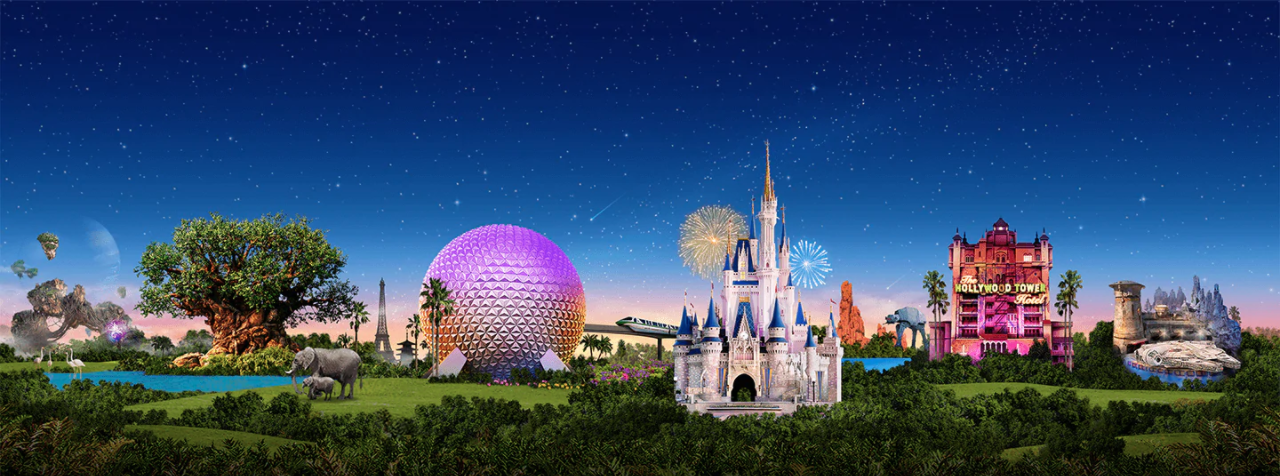2. MEDIUM PICTURE: Maturity within a resort
CASE STUDY: The growth of Walt Disney World
Altogether, the concept of “multi-theme-park resorts” is relatively new.
While Disney World kinda created the idea, it was mostly haphazard. Walt never explicitly called on his “Disney World” to feature multiple theme parks, and in fact only planned on building a “Disneyland East” as a concession to get to his real goal: the E.P.C.O.T. city that was abandoned after his death. Walt Disney World was instead pivoted to become “The Vacation Kingdom of the World,” of course, and the unprecedented idea of a second theme park on the property was born just 11 years later with 1982’s EPCOT Center. Just seven years after that came the Disney-MGM Studios, then nine years after that was Animal Kingdom.
But anyone who’s traveled around Walt Disney World’s network of highways, buses, Monorails, ferries, water taxis, parking lots, and Skyliners will tell you, it was far from master-planned. Instead, the distinct parks and resorts and waterways and regions within the 40-square-mile property have been placed somewhat haphazardly and connected clumsily – something we imagine Disney might actually change if they could start over from scratch.
Disney World is also the perfect example of maturity within a resort. After all, Walt Disney World is about to celebrate its 50th Anniversary and, taking stock of that half-century, Disney constructed four parks roughly in the first half of its life, and zero parks in the next half. Why? Put simply, going from one theme park to two theme parks does not double attendance or profit. Likewise, going from two to three; three to four; four to five... At some point, the complex formula of start-up cost, ticket revenue, and length-of-stay converge in diminishing returns and – eventually – significant long-term expenses.
And worse, you’ve likely heard of the concept of parks cannibalizing each other – in other words, rather than causing guests to lengthen their stays, they may simply opt to visit fewer parks. When Hollywood Studios opened, Epcot’s attendance fell to compensate. When Animal Kingdom opened, it was met with a drop in attendance at Epcot and Disney’s Hollywood Studios. While building another park may incentivize people to add another night's stay and another day's visit, it may just as easily convince them to replace a visit, such that the incremental increase in guests that may come with a new theme park doesn’t necessarily equate to more revenue. Instead, it creates a situation – like at Disney World – where you have massive, staff-insensive properties with relatively low ride counts and a much slower schedule of reinvement in each as they share capital budgets.
So while rumors of a “fifth gate” will persist and crowds on discussion boards and Facebook will doubtlessly see parks’ popularity and wait times and declare “it’s time for a fifth park,” it’s just not that simple. At least in the latter half of Disney World’s life, the powers that be seem to believe that in terms of its gated units, Disney World is saturated; mature.
So the question for us is, is Universal Orlando Resort saturated with parks?
"Resort" Problem 1: Universal Orlando Resort(s?)
Epic Effect: NEUTRAL (/)
As we look at Universal Orlando Resort specifically in terms of its maturity, what do we see? In terms of the all-important “physical space” variable, there’s a pretty compelling picture. Unlike Walt Disney World’s decades-long, piecemeal expansion into a multi-park resort, Universal Orlando is a different beast. Whether you prefer its style or not, Universal’s growth into a resort looks and feels different by way of master-planning. In other words, Universal Orlando developed not haphazardly, but all-at-once in a gargantuan transformation in 1999 that set a consistant style, shared aesthetics, pedestrian-based planning, and 21st century design. It feels interconnected, holistic, intentional, and purposeful... because it was.
There’s a tremendous elegance to its “campus,” with purpose-laid walking paths ambling through bamboo gardens along the perimeter of man-made waterways, passing resort hotels launching water taxis to the central CityWalk lagoon; even the ugly side of such an enterprise – cavernous parking garages – were carefully planned such that moving walkways whisk guests toward a central point, depositing them in the center of the “kidney bean” shaped CityWalk, with mirrored bridges on either end leading to the towering icons of the resort’s two theme parks – the Pharos Lighthouse and Studio Gates, respectively – nestled against one another as a poetic dichotomy.
So, yeah, spatially, Universal Orlando is mature. It has taken its alloted space and maximized it, filling every acre of its land with parks, support facilities, hotels, parking without a hint of randomness of inefficiency.
So much so that Epic Universal will famously be set in a new, separate “southern campus” comprised of land Universal's been acquiring for years. Likely, this new property will be accessible only via shuttle bus (or, to be fair, on foot from the Orange County Convention Center area). In fact, some people are worried that Universal might be making its infamous "Universal Escape" branding mistake once more, being a little too vague about what Universal's Epic Universe even is. Is it just a name for the collective "mini-theme-parks"? Does it refer to the "mini-theme-parks" including the shopping district between them? The entire "southern campus" – a resort within the resort – while the name of the theme park will be announced later? If industry fans don't understand, how will the general public?
With so much still unknown about the physical set-up, we’ll rank the effect of the physical space as “neutral.” It’s not Universal’s fault that their initial real estate isn’t large enough to have foreseen the desire for a third park, and Epic Universe is no father from Universal Studios Florida than Animal Kingdom is from Magic Kingdom – just with tourist sprawl in between rather than wilderness... In other words, the way that they get guests there will be an essential piece of bringing the puzzle together and making the Universal Orlando Resort feel cohesive.
"Resort" Problem 2: Got guests?
Epic Effect: POSITIVE (+), but skeptical
But of course, the more important factor for assessing the maturity of Universal Orlando Resort must be its attendance. No doubt, Universal’s attendance has grown by leaps and bounds since the 2010 opening of the Wizarding World of Harry Potter, and its two parks rank impressively among the most-visited theme parks on Earth. While each of us may have anecdotal evidence about friends who buy a “1-Day, Park-to-Park” ticket to marathon the Potter attractions and leave, Universal’s move into a third park must signal that their evaluation says differently.
After all, there’s no way Universal would’ve opened an on-site water park (Volcano Bay) and no less than four hotels (Cabana Bay Beach Resort, the Aventura Hotel, Surfside Inn, and Dockside Inn, totaling nearly 5,500 hotel rooms and thereby more doubling the resort’s capacity in the last five years alone) without adequate evaluation that their expanding resort can support it, nevermind that Epic Universe will have its own deluxe hotel at its core
So altogether, it seems that Universal does not view their own Orlando resort as mature. Just the opposite, they seem to think that it can expand well beyond its existing borders in support of an entire second “campus” with Epic Universe at its center. If their internal numbers suggest that a massively ambitious and wildly expensive project like Epic Universe will be met with appropriate guest demand, we can only trust it and say this evidence is a plus. But Universal doesn't exist in a vacuum...
"Resort" Problem 3: Cross-pollination?
Epic Effect: NEGATIVE (–)
Even if Universal’s own evaluation and numbers suggest that “if we build it, they will come,” we feel that there’s one more piece of the puzzle to consider in regards to the maturity of the resort. For better or worse, Disney World and Universal Orlando are inextricably linked. Especially if Universal intends to continue going after the existing (and largely Disney-centered) Orlando vacation market, there’s an argument to be made that maybe we ought to view the maturity of Universal Orlando a little more broadly; that it’s really a case of the maturity of the whole Orlando market.
It brings us back to that inevitable look at Orlando. Once Epic Universe opens, guests vacationing in Orlando will find between Disney and Universal’s campuses seven theme parks, never mind the three water parks and three dozen resort hotels. So rather than examining the maturity of Universal Orlando in a vacuum, consider it that way. Will Epic Universe convince families to add another night’s stay in Central Florida? Or will the city’s seventh major theme park lead families to make some hard decisions about how to spend their time and which parks to skip?
And if they do decide to visit Epic Universe instead of one of Disney or Universal's six other parks, which do you think it will be? Will they skip Magic Kingdom? Probably not. Epcot with its new Frozen, Ratatouille, and Marvel rides? Doubtful. Hollywood Studios with Galaxy’s Edge? Nope. Animal Kingdom and the must-see Pandora? Ehhh… Unfortunately, we’re worried that we’ll end right back up in that “cannibalizing” situation where families opt to skip the Studios. Unfortunately, that’s a question no one can answer yet… But for now, we have to rank this as a major issue and evidence that’s really against Epic Universe…
But it’s not even our biggest worry about Epic Universe… Zooming in from maturity in the industry and maturity within the resort, let’s get to the heart of the issue...









Comments
Thanks for the interesting read. I always love reading your articles; they are so well researched and I love the history! Keep up the good work!
We are annual visitors to Orlando and DVC members, so Disney parks are our first stop, but we do go to Universal. Other than Wizarding World, I have become less impressed with Universal. So many of the RIDES have been replaced by what I call the same ride, different movie. Basically, a car of some type transporting you through a series of screens. Going away is the actual theme park ride, like Jaws. The studios tour of "backlot" movie magic is also gone. These are things that made Universal (and Hollywood Studios) different from other theme parks around the country and why a trip to Orlando is a different experience.
It’s usually a concept once you build it in one theme park, it’ll come to the other ones (like Harry Potter) so they’ll probably build super Mario land and then put 2 other Nintendo properties in Islands and Uni so you have to visit all three. Smart idea and they’ll do exactly that.
They know what they’re doing.